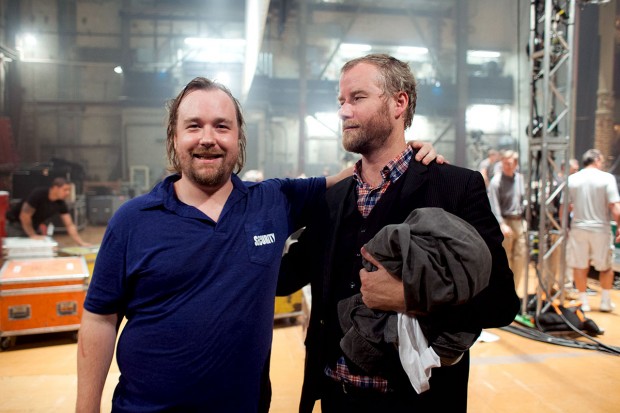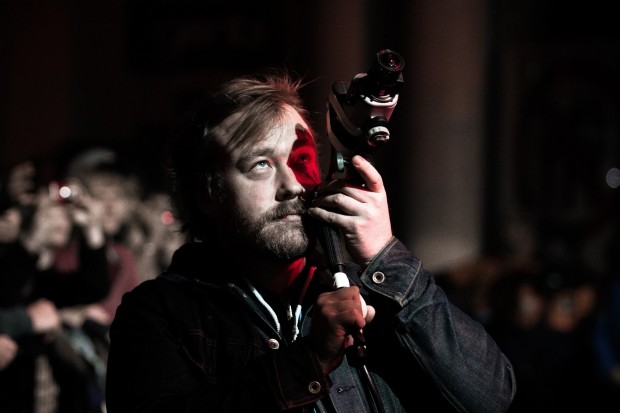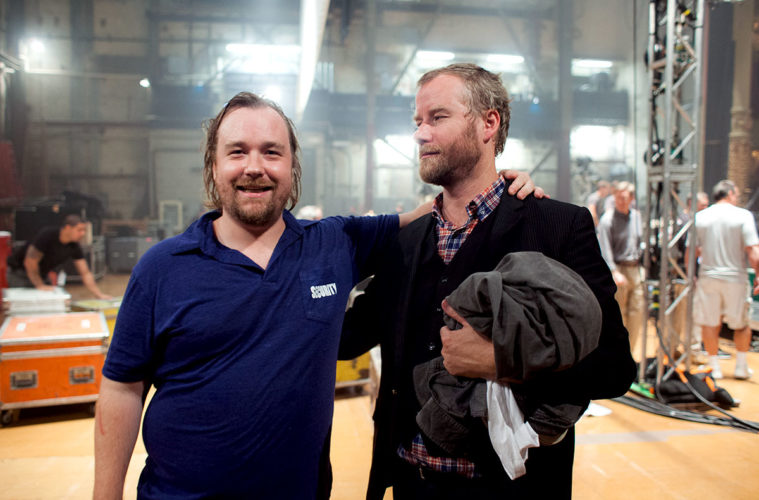
Plugging away since 1999, The National finally hit mainstream success with the release of their 2010 album High Violet. Of course, this entailed their first world tour, but in the new documentary Mistaken For Strangers, it’s only the backdrop for the relationship between lead singer Matt Berninger and his younger brother Tom, who had no idea that these short videos he was shooting would turn into a public document of their troubled, if still loving brotherhood. Ahead of a VOD and theatrical release this Friday, we talked with the duo about their film influences, deleted scenes, how the documentary came to be, how the experience informed their latest album, and much more.
The Film Stage: In the press notes there’s an anecdote about how when you two were kids, Matt came home from seeing Predator to tell you what an amazing film it was; has film always been a shared experience for you two? I don’t mean just going to see them together but rather in that they made you share emotions?
Tom Berninger: Yeah, when my brother was 16 and I was 7, we’d sit out on our driveway and Matt would actually talk pretty intelligently to a 7-year-old about movies. Of course, those movies were mainly Predator and Terminator and Alien, but we did share a lot in common with movies. Later in life my brother really started to go after those The Graduate and Harold and Maude movies — and I like those movies — but I was deeper into the science-fiction and horror. But we still share a lot of interests in the same things, especially the comedies. I mean my favorite, right now, is probably Alexander Payne, and I think my brother shares some of the same sentiment.
What were the different forms you thought the film would take on? A home video? A concert film?
Tom: Well, the reason it looks the way it does is because I had a camera wrapped around my neck, and all I really wanted to do was make a web series that a website could show; that’s all it was originally going to be, and I never thought about making it a documentary at all. It was lo-fi because it was a tiny little camera wrapped around my neck and I was kind of a fly-on-the-wall and I captured whatever I could; I mean, there was no film crew, there was nothing.
Matt Berninger: I thought maybe he could make a video for us, which he did; he made a scrappy kind of video for our song, “Terrible Love,” and then little stuff that we put on our website, but that’s all we really thought Tom was going to be doing, anyway, and none of us expected him to turn it into a feature documentary. If we knew it was going to be that way, we wouldn’t have let him shoot half the stuff he did.

At one point in the film you see a wall containing all these post-it notes with scenes written on them, including ones not in the final film. Can you talk about anything exciting that was cut?
Tom: There was a lot of stuff that was cut. That wall was basically every scene that I liked, but that didn’t necessarily mean the band liked it. There’s a few scenes, I mean, on tour, I had a crush on this girl, and I think everyone knew it but she had this boyfriend and she knew that I kind of liked her, but we cut together a little interview I did with her that made her feel very awkward, where I was asking her if she had a boyfriend. But that was my favorite thing that we cut, and I wish that was left in, but I had some of the band guys in their underwear and Bryan, the drummer, naked in the shower; I think I got every band member naked at some point, but that didn’t quite make it in, thank God.
You could say this is very much a dude movie because it’s about two brothers, but how much did [Matt’s wife] Carin’s role, in editing, give it more of a feminine perspective?
Matt: What happened was, after Tom got fired, I’d felt bad for what had happened, so I’d invited him to move in with us. My wife — who was a fiction editor at The New Yorker for eight years — and her perspective came to it when Tom was really digging through all this footage and trying to figure out if he had anything or if it was just useless garbage that he couldn’t do anything with. She was the one who saw all this footage of Tom in these kind of unflattering moments, and I think it was very much an interesting story to her. She didn’t have any interest in watching a band on tour backstage or on buses or whatever, but that alone for her was not something that she really cared about, so it was really the family relationship. She’s got a younger sister, and the dynamic between Tom & I was what she fond most interesting and compelling, so she and Tom really started cutting towards that, and bringing Tom much more into the story, to a point where Tom’s story eclipses the whole story of a band on tour, in a really good way, and I think even the band is really happy that the movie turned into something more than just the profile of a band.
Tom: I definitely see the dude element, because it’s a story about brothers, but I step back and I think it really has to do a lot with family. To call this a guy’s movie is like calling Alien a girl’s movie because of Ripley. So I think that it’s a good story about family and siblings as opposed to just guys.
How much was your last album, Trouble Will Find Me, a response to these events?
Matt: The seeds of that record all happened during that tour when Tom was there and, then, the film actually continues into the beginnings of the next record, but Tom’s presence for High Violet, both on tour and in my home, living with me, after he got fired — I mean, he was in my mind and my house for Trouble Will Find Me. I mean, the song “I Should Live in Salt” is very much about Tom. I mean, Trouble Will Find Me isn’t about Tom, but the title is actually very fitting for him, now that I think about it, as trouble does seem to find him more than anyone I’ve met.

Mistaken For Strangers hits VOD and theaters on March 28th. See our review, the trailer, a 10-minute documentary on the film, and more here.

